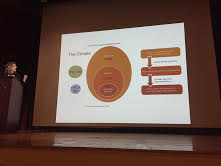Changing the Climate of Climate Change

Naomi Klein, an activist for environmental sustainability spoke at NYU in hopes to spread the conversation regarding climate change activism.
October 3, 2016
Award-winning author Naomi Klein discussed her book “This Changes Everything: Capitalism vs. the Climate” at NYU’s Law School on Friday, Sept. 30.
Klein spoke as part of the NYU Office of Sustainability’s first Educating for Sustainability lecture series, which will be held throughout the year in cooperation with the Earth Matters club.
CAS senior Natalie Petrulla, the president of Earth Matters, said this series follows the theme of women with prominent roles in the climate change debate.
“Naomi is one of the most famous female environmentalists, so naturally we reached out to her first,” Petrulla said. “I am very happy with the content that she covered because it really explained where we are at in the climate movement and where we go from here.”
The event discussed the relationship between capitalism and climate change, and Klein engaged with the audience by unveiling the disastrous effects of changes in climate as a result of our profit-driven economy.
Klein said that the response to this dramatic situation must be radical, and the world’s leaders must make extensive changes in policies to fight
climate change.
“The Paris Accords do represent a serious diplomatic breakthrough and attempt at cooperation, but if it’s all we do, it is an ecological disaster,” Klein said.
At the Paris Climate Agreement, world leaders committed to limiting the world’s increase in temperature to 2 degrees Celsius or below. Klein described how humans are dangerously close to exceeding the budget for fossil fuel production. The limit is 1.5 degrees C, which equals 393 gigatons of pro-carbon fuels, but there are over 500 gigatons of fossil fuels in our reserves.
This violation is just one of many contributions to the disastrous effects of climate change on the planet, such as through wildfires, severe floods and immense temperature increases. Klein also cited the forest fires in Canada this past summer, the death of a large part of the Great Barrier Reef and the melting of concrete streets in New Delhi where temperatures reached 124 degrees Farenheit during the hottest August on record.
Klein said that governments worldwide have yet to make climate change a priority, since the Paris Accord is not legally binding.
“Had we acted in the 1980s when the threat of climate change had been declared, this could have been a gradual process,” Klein said. “Having waited so long, we now have to act rapidly and cut our emissions by 8 to 10 percent for countries like the United States.”
But Klein said that it is not all bad news. She discussed how activism is happening all over the globe in the hopes of reaching into the political process, and she emphasized the key role of women, especially those in indigenous communities who suffer most directly from climate change. Petrulla said that she hopes to bring and incorporate this conversation at NYU.
“My goal is to incorporate the role of women and other marginalized groups into the discussion about climate change on campus,” Petrulla said. “It is important to show that climate change is about more than just animals going extinct and the world getting a little warmer, but that it is a complex issue that also affects social justice.”
Klein also mentioned how divest movements have appeared nationally on university campuses and recognized the effort of the NYU Divest group, which has been on the frontlines of the fight with the NYU administration for divesting from fossil fuels.
“It’s not about saying that climate change is so important and so urgent and we’re on such a tight deadline that first we’ll solve climate change and then we’ll solve poverty and racism,” Klein said. “We live in a time of multiple, overlapping crises, so the task for us now is to design more integrated solutions.”
A version of this article appeared in the Monday, Oct. 3 print edition. Email Ludovica Grieco at [email protected].























































































































































